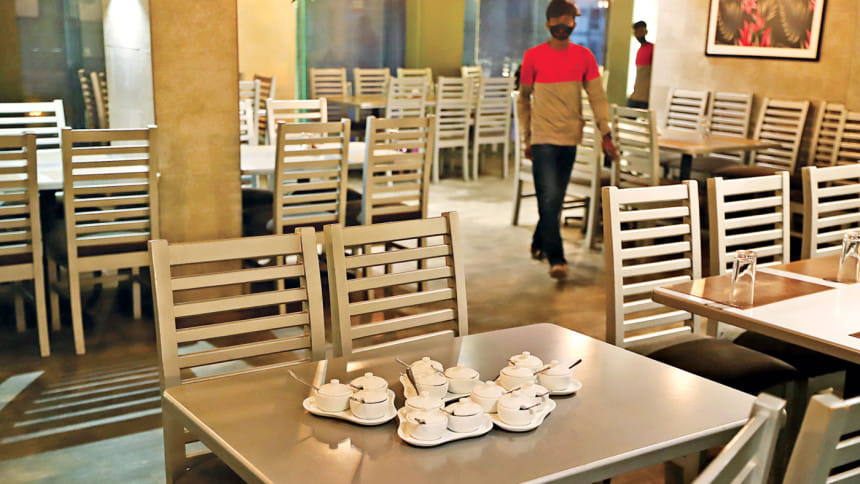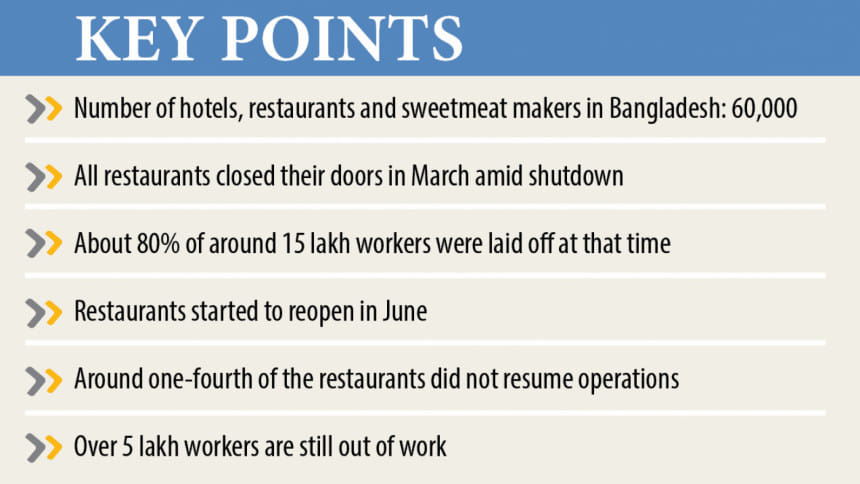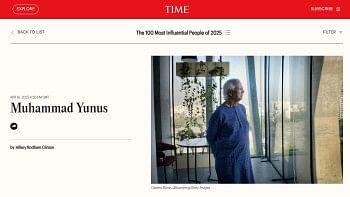Hundreds of restaurants in Dhaka closed for good

Hundreds of restaurants in the capital have already been permanently closed as the owners are unable to cover operational costs while suffering from decreased revenue amid the ongoing coronavirus pandemic.
However, another 1,000 restaurants are now at risk of closure as low customer turnout and the exorbitant cost of rent have left the country's food service providers in a dire situation.
Since the Covid-19 outbreak began in March, the hospitality industry has been among the worst hit sectors of the country as customers are avoiding food from outside their homes in order to prevent infection.
When economic activities started to accelerate from June, only a few restaurants reopened their doors.
Since August though, majority of the restaurants have been operational but the sector has only regained about 50 per cent of its business compared to pre-pandemic era.
However, there are still over 1,000 brick-and-mortar food service providing entities who are uncertain whether they will ever be able to reopen.
In 2018, Nadvie Ahmed and a few of his partners established two outlets of the Bhoj company, a catering service that features dishes and recipes of Kolkata. As business was booming, they kick-started another venture named Painted Chopstick in Banani the following year.
All was well but only until the virus started to spread across the country.
"The flow of the customers started to slow from the beginning of March. And when the country went into lockdown, over 90 per cent of our business plunged," he said.
But after failing to pay the exorbitant cost for rent of three outlets and the import of certain ingredients, Ahmed was forced to close down his business in early June.
Besides, during the two-month nationwide 'general holiday' aimed at curbing the spread of Covid-19, when their business activities were nearly zero, inflated electric bills only weakened their morale further.
"So, after evaluating everything, we closed down our outlets permanently," Ahmed said, adding that they incurred huge losses.
Royal Canton, a wing of the Royal Thai Restaurant in Banani 11, has been shuttered since March.

"The restaurant will not reopen even after the end of the pandemic," said Rafi Quasem, the restaurant's owner.
"I am trying to survive on loans but the banks are offering such small amounts that it will not benefit me in the slightest," he added
Genetic Building, where Royal Canton is located, houses around 10 restaurants, half of which have not reopened.
"Most of the restaurants that haven't opened will not open again," he said.
However, business for his other venture, Royal Thai, has been slowly gaining momentum since August.
The restaurant has now recovered 40 per cent of its business.
Buoyed by a decade of steady economic growth and a rise in the people's income, the restaurant business in Bangladesh boomed in the last five years.
This led many youths to invest in the sector despite having next to no experience or research before jumping into the business.
"People like me who have experience in the restaurant business somehow managed to survive by borrowing money from different sources. However, the newcomers were especially ravaged by the pandemic," said Ashfaq Rahman Asif, managing director of Tarka Restaurant.
Asif is a partner of around half-a-dozen restaurants, just one of which has remained closed since March.
So far, he regained 50 per cent of his business in the restaurants he is involved with but fears that there could be a second-wave of Covid-19 in the upcoming winter.
He also attributed his survival to rent concessions from landowners.
"We had to renegotiate with the landowners and make them understand that if we close down our business, they will also suffer. Some agreed with us," he said.
Asif went on to say that the meteoric rise in online food delivery during the pandemic is a myth as only 10 per cent of orders comes from various delivery platforms.
"Even in that case we are facing challenges as some delivery platforms are installing 'cloud restaurants' and promoting their products on their site," he added.
A cloud kitchen is a take-away or home delivery point which has no dine-in facility.
The number of food service establishments in the country is estimated to be about 60,000, including hotels, restaurants and sweetmeat makers, where more than 15 lakh people are working, according industry insiders.
About 10 per cent of such establishments have closed down for good, Rezaul Karim Sarker Robin, general secretary of the Bangladesh Restaurant Owner's Association, told The Daily Star.
"Dhaka city alone witnessed closure of hundreds of restaurants," he added.
Over 15,000 restaurant and food service providers have yet to reopen and over 5 lakh restaurant workers and waitstaff have remained unemployed since March, according to the association, which has over 12,000 members.
"We have repeatedly urged the government to provide loans and waive utility bills. But none pay heed to our demands," Robin added.
According to the association, restaurant workers have not received any of the cash aid given to 50 lakh poor families. Robin said the customer turnout at his restaurant is slowly gaining pace and the overall sector recovered only 50 per cent compared to the pre-pandemic level.

 For all latest news, follow The Daily Star's Google News channel.
For all latest news, follow The Daily Star's Google News channel. 



Comments